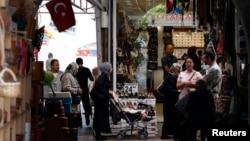ISTANBUL —
With the international economic crisis continuing to bite, the Turkish government has announced it will be seeking to tap into the $1 trillion Islamic financial industry.
Although Turkey is a secular state, it is overwhelmingly Muslim. Under the decade-long rule of the country's Islamist rooted AK Party, Muslim-compliant businesses have flourished.
Thee government move into Islamic finance is a smart strategy, said Attila Yesilada, an Istanbul-based political analyst with Global Source Partners, a political consultancy firm.
"There were people and institutions who refused to take interest and these people kept their money in non-interest safe deposits," he said."They suffered huge losses just because they genuinely believed interest is sinful as defined by the Koran. So there is a lot of demand for Islamic banking products in Turkey -- both from...devout Islamic client base as well as from the Gulf kingdoms."
Islamic banks operate in compliance with Islamic financial rules which ban interest. But Islamic banking firms use Islamic-compliant financial instruments to generate income. In the past decade, that sector has rapidly grown into an estimated $1 trillion industry.
Most of that growth has happened in the energy rich Gulf states and North Africa. In Turkey, the growth has been less impressive, with only four institutions currently offering Islamic finance, though these banks have seen some growth.
Omer Bolat, the CEO of the conglomerate Albayrak and former head of the Islamic business confederation Musiad, said the government's decision to enter the Islamic finance market provides an important political guarantee given that previous Turkish governments, which were staunchly secular, viewed it with suspicion.
"Before this [present] government came to power, the outgoing governments were not sympathetic to Islamic banking sector and the government could shut them down with a decree or law easily," Bolat said. "And depositors feared if these banks were shut down [they] might have to lost their deposits."
Stronger Islamic banks would enable Turkey to attract more cash from the Gulf and Asia, where the appetite for Sharia-compliant products far outstrips the existing supply, according to observers.
This could potentially make Istanbul a regional financial hub, said Inan Demir, chief economist at Istanbul-based Finansbank.
"If the government and economic administration has ambitions of being a regional financial center, then that financial center will have to take in the Middle Eastern and North African regions as well, where Islamic practices dominate," Demir said. "So in that sense, it could have some response with the Middle Eastern and North Africa markets."
For now, Europe still accounts for the lion's share of trade with Turkey's financial institutions and wider economy. But with Europe still in the grip of financial woes, the Turkish economy is diversifying and looking at alternative markets in the Middle East or North Africa. The development of Islamic finance could become an increasingly useful instrument in that strategy.
Although Turkey is a secular state, it is overwhelmingly Muslim. Under the decade-long rule of the country's Islamist rooted AK Party, Muslim-compliant businesses have flourished.
Thee government move into Islamic finance is a smart strategy, said Attila Yesilada, an Istanbul-based political analyst with Global Source Partners, a political consultancy firm.
"There were people and institutions who refused to take interest and these people kept their money in non-interest safe deposits," he said."They suffered huge losses just because they genuinely believed interest is sinful as defined by the Koran. So there is a lot of demand for Islamic banking products in Turkey -- both from...devout Islamic client base as well as from the Gulf kingdoms."
Islamic banks operate in compliance with Islamic financial rules which ban interest. But Islamic banking firms use Islamic-compliant financial instruments to generate income. In the past decade, that sector has rapidly grown into an estimated $1 trillion industry.
Most of that growth has happened in the energy rich Gulf states and North Africa. In Turkey, the growth has been less impressive, with only four institutions currently offering Islamic finance, though these banks have seen some growth.
Omer Bolat, the CEO of the conglomerate Albayrak and former head of the Islamic business confederation Musiad, said the government's decision to enter the Islamic finance market provides an important political guarantee given that previous Turkish governments, which were staunchly secular, viewed it with suspicion.
"Before this [present] government came to power, the outgoing governments were not sympathetic to Islamic banking sector and the government could shut them down with a decree or law easily," Bolat said. "And depositors feared if these banks were shut down [they] might have to lost their deposits."
Stronger Islamic banks would enable Turkey to attract more cash from the Gulf and Asia, where the appetite for Sharia-compliant products far outstrips the existing supply, according to observers.
This could potentially make Istanbul a regional financial hub, said Inan Demir, chief economist at Istanbul-based Finansbank.
"If the government and economic administration has ambitions of being a regional financial center, then that financial center will have to take in the Middle Eastern and North African regions as well, where Islamic practices dominate," Demir said. "So in that sense, it could have some response with the Middle Eastern and North Africa markets."
For now, Europe still accounts for the lion's share of trade with Turkey's financial institutions and wider economy. But with Europe still in the grip of financial woes, the Turkish economy is diversifying and looking at alternative markets in the Middle East or North Africa. The development of Islamic finance could become an increasingly useful instrument in that strategy.




